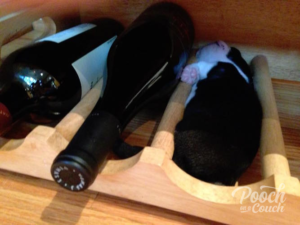“Do you live in dead silence?” my trainer asked me as she was assessing Levi’s appropriateness for group training classes.
I was speechless.
Levi was a handful, but I hadn’t thought that maybe I’d had something to do with that. He was my first go at fostering a newborn puppy and raising a rescue puppy.
Levi was healthy, happy, and vetted for his age. I’d even house-trained him already and he loved his crate. He also knew quite a few basic manners. He was a good puppy.
While I had a mentor to help guide me through caring for a puppy born with a severe cleft palate, in my overwhelm I’d failed to consider that I might need guidance for raising a puppy.
If I knew then what I know now, I would have raised Levi using better practices. I would have raised this rescue puppy using a puppy rearing program.

My First Go At Fostering Puppies
About Levi, briefly
Levi was born with a severe cleft palate to a breeder who didn’t want to care for his special needs. She’d OK’d his euthanasia, but the vet decided to save him instead. Because of his deformity, he already had aspiration pneumonia at birth. The veterinarian stabilized him and at 11 days old, Levi came to foster with me.
With guidance, I fed Levi around the clock through a tiny tube until he was feeding and hydrating himself independently at about 4 weeks of age.
I also taught him basic manners like sit, down, stay, wait, come. He loved playing with my dog Otis (who was surprisingly accepting of Levi) and Levi had many visits with my adult friends.
My biggest challenge was keeping up with him! He was a very busy puppy.

But. I live a very, very quiet life. That affected Levi. While I kept him alive and healthy and happy, I’d failed to raise a well-balanced rescue puppy. I’d failed to properly expose him to enough new experiences. Therefore, when I took him out into the big, big world, he became overwhelmed.
For Levi, walks were hard, meeting new people was hard, and experiencing new environments was hard.
Levi’s biggest strength was that he loved to learn. He loved training.
Levi did get to attend that class. With the trainer’s expertise and using a customized plan, we were able to manage his over-arousal in class without having to abort the session.
I wonder what he would have been like, how easier his puppyhood would have been if I’d thought to learn how to raise a newborn puppy using methods that reputable breeders do.
Fostering to keep a puppy alive and healthy is one thing. Fostering and RAISING rescue puppies to something totally different.
You Are Already A Pro at Fostering Litters of Puppies!
So many of you foster puppies over and over and over. It’s what you love! Friends, my hats off to you, because I know how hard it is to care for a litter of puppies.
Shoot. Taking care of one puppy is hard!
Many of the puppies you foster are born either premature or sickly and are almost certain to have heavy loads of intestinal worms, protozoans, and possibly viruses. It can be a fight – an exhausting fight – just to help them survive.
So many of you are pros at managing the medical needs of puppies: bottle-feeding orphans, caring for sick puppies. You know how to quickly recognize and treat worms, protozoans, and… the dreaded parvovirus. You stand by your vaccination protocols and are super committed to your spay-neuter policies. All of that is a lot of work.
Hearing me suggest that there is more to do with raising rescue puppies may feel like a punch in the gut or you think it sounds like out-of-touch idealism.
I think raising rescue puppies like reputable breeders raise theirs will likely make your puppy fostering life easier.
Yeah. I said that!
What’s The Big Deal? My Foster Puppies Are Social and Happy!
What’s the big deal?
We are fostering litters of puppies by the tens of thousands and then adopting those puppies out with an inferior set of social skills.
Just like a backyard breeder.
Raising A Litter Of Puppies
From The Day A Litter of Puppies Is Born, The Clock Starts The Countdown.
It is important to remember, a puppy’s first 16 weeks is all the time we have to help a puppy learn through experiences we help provide.
These experiences largely influence a dog’s “outlook” throughout its life.
The experts say that a puppy’s socialization period lasts from about week 4 until week 16. There are a lot of life lessons to present to a puppy and offer them time to practice. What a puppy misses can be very difficult to gain after the 16-week mark.
Read this –> Puppy Socialization: Does It Mean What You Think It Means?
The cost to help a puppy gain skills missed during the socialization period can be expensive, time-consuming, and partially effective.
We Can’t Expect Adopters To Do All Of This Important Work
If we wait for the adopter to begin the socialization training after adoption, they will not get it all done. And the wide-open door to this specific learning closes at 16 weeks. BAM.
I watch my friends who’ve adopted puppies from both rescue agencies and from reputable breeders. The puppies from reputable breeders who’ve used a puppy rearing program act different. Seem different. ARE different.
And it isn’t all genetics.
Let me be clear: I do not believe for a minute that all rescue dogs are “broken” or screwed up or defective.
Many rescue dogs are normal, well-balanced, social, confident, happy dogs despite their journey into our care. We rescue a lot of great dogs that are no worse for the wear and somehow, somewhere, got the skills they needed to navigate this big, busy world with ease.
Puppies that grow up in a safe, protected quiet back bedroom in our house do not the the experiences they need unless we help them.
Let me tell you about a litter that grew up in a quiet space…
Fostering A Litter Of Puppies And Losing Sleep.
I fostered one litter of 5 puppies for about a week. They were 11 weeks old and were not raised with a puppy rearing program. These adorable knuckleheads turned my household upside down.
The litter of puppies were fat and overall healthy and generally happy dogs. They were up to date on their vetting.
However, they’d been kept in an empty upstairs bedroom along with their mama, safe from stress and noise. Several times a day, the foster mom came up the stairs and provided food, clean water, and fresh bedding. Clearly, she’d also spent time loving on each puppy.
Sounds perfect, right?
Well, They’d inadvertently been conditioned to respond to any noise as it signified that a human was approaching and good things were about to happen!
So, when I put them in my living space right in the middle of all the action, they were overwhelmed with the noise and movement. They screamed (and I mean screamed!) at every sound. Even those spooky 3 a.m. sounds that I normally sleep through!
- When I walked by. (hundreds of times a day)
- When I coughed or sneezed.
- When the HVAC kicked on.
- When the refrigerator dumped ice.
- When my phone dinged.
- When my old house creaked.
And I could go on.
By this age with no prior exposure, crate training became hard and separating them out for individual attention became hard. House-training was already out of the question and would need to wait until each puppy was in its individual home. With my prior experience (and subsequent awareness) with Levi, I knew these puppies were a bit behind.
Noble was raised with a puppy rearing program.
Noble, an 11-week-old Boston-Dachshund puppy I fostered was raised using a puppy rearing program.
It was a totally different experience.


Noble was about the same age, 11 weeks, when he came to foster with me. He was a totally different puppy. He was quiet, confident, and self-assured. He was just as happy by himself with his toys as he was in my lap. If he wanted my attention or help he knew how to ask for it.
He was nearly house-trained (his Dachshund genes were strong!) and once he and I agreed upon a method to get him to potty outdoors he never had another accident inside.
He was a dream puppy.
What Do Adopters Say About Their Puppies?
Besides my personal experience, I’ve had the opportunity to listen to the community where our puppies are adopted. They have things to say.
Since resigning from my rescue administrator responsibilities, I’ve had the time to put myself into a diverse set of social media groups with dog people.
Most of these people have adopted rescue dogs. Many of them struggle with their adopted dog’s behavior:
- difficulty with grooming
- various phobias
- sensitivities to motion and noise
- difficulty meeting new pets or people
- poor play skills
- separation anxiety
- poor bite inhibition
and I could go on.
My heart hurts when I listen to their frustrations, feelings of defeat, exhaustion, and yet they keep going because they do love their adopted dog and their heart hurts when they watch their dog struggle so.
I believe we have an opportunity AND A DUTY to provide our litters of puppies a better head start so that they and their owners maybe don’t have to struggle so.
Shouldn’t we try?
If we are going to continually fight against backyard breeders, puppy mills, and unwanted litters, we ought to put our effort where our mouth is.
We need to start fostering and raising litters of puppies in rescue just like reputable breeders raise theirs.
You Can’t Learn How To Foster A Litter Of Puppies on Google.
You can get a lot of bad advice on Google.
In fact, did you know that some posts on Google will tell you that you shouldn’t handle newborn puppies?? Yep. That’s wrong.
Truth is, you can and should handle newborn puppies. Know what you are doing, though. There is a right way, a wrong way, a safe way, and a life-threatening way to handle puppies.
Did you also know that puppies and their mama are not on autopilot for the first couple of weeks?
“What? I thought we were to leave them alone and let mama do her thing!” Our job is to check in and do laundry.
The truth is, we can help puppies get a head start on growth and development starting in the first few days after birth!
I Want To Foster and Raise A Litter Of Puppies From Birth
One of my goals for 2021 is to foster a pregnant dog through delivery of the litter and raising the litter of puppies until adoption or age-appropriate stage. When I do, I will be using a puppy rearing program as well as partnering with a reputable breeder and puppy rearing support system.
I’m gonna put my effort where my mouth is and do what I’m asking you to do: Begin raising litters of puppies using a puppy rearing program.
Fostering A Litter Of Puppies Using A Puppy Rearing Program.
You Can See The Difference in Puppies Raised With A Puppy Rearing Program.
It was one of my foster dog parents that told me about this puppy rearing program she’d learned of and asked if she could use it with the litter about to be born.
She was super-skilled in puppies already, so when she shared what she knew about this program, I didn’t hesitate to advocate for the purchase.
I think we paid around $150 for the program materials recommended for rescue foster homes.
The protocol was organized by weeks with certain tasks and goals to meet. For example, week one included daily weigh-ins for each puppy to monitor growith as well as the introduction of some simple ENS (early neurological stimulation) exercises.
As the puppies became more active and developed in their senses, goals shifted to exposure to different types of stimuli and activities that encouraged healthy musculoskeletal development. The program outlined specific activities and goals that allowed for your creativity.
Our foster dog mom observed several significant benefits to using the puppy rearing program as she interacted and worked with this litter of puppies. Three of the most eye-opening observations were:
- The puppies were well on their way to being house-trained at 8 weeks.
- The puppies were overall content and happy. Less fussiness, frustration, or attention-seeking barking or whining.
- The puppies overall were confident in their response to new experiences.
The first two ought to be enough to convince you to try this program! I know you want less poop smeared everywhere and you surely want less noise!
Attach Yourself to Those Who Raise Litters Of Puppies Using Puppy Rearing Programs.
Puppy rearing programs are not some new-fangled science. They have been developed with a half-a-century worth of breeding knowledge, experience, and science. So, I wouldn’t be honest if I were to tell you that all you need to do is buy the workbook and self-study.
You and your puppies will gain more from the experience if you connect yourself with those who do puppies for their profession – BREEDERS. Reputable ones.
There are even accountability groups for litters born in particular months, so that you can be working alongside those puppies that are around the same age as the litters you are raising.
The puppies you will be placing into the community are going to be, hands down, better puppies than those you adopt out without using a puppy rearing program.
What Will You Learn When Fostering A Litter Of Puppies Using a Puppy Rearing Program?
Things you will learn when fostering a litter of puppies using a puppy rearing program:
- understanding startle vs fear and how to use the startle response effectively. Those of you who already work with fearful dogs see the power of fear imprinting and how hard it can be to undo in the adult dog.
- knowing when to introduce momentary separation from littermates and lay the foundation for human bonding. Furthermore, you’ll learn how to help prevent future development of separation anxiety.
- knowing when to introduce safe exercise.
- knowing when to begin introductions to a variety of household activities and objects.
- knowing when and how to introduce crate training to puppies. It is earlier than you might think!
- knowing how and when to help puppies learn how to self-soothe, make requests, solve problems, and more.
- learning about fear periods: how to recognize them and what to do.
- introductions to leash walking, recall training, and giving up toys.
- learn how to lay the foundation for house-training well before puppies are ready to leave their littermates!
- and more!
I’ve talked with several people who use puppy rearing programs and the vast majority of them use Puppy Culture. They like this program because it is sound in science, organized well and it offers built-in flexibility so you can implement the objectives within your space, creativity, and budget.
Puppy Culture offers a workbook organized by weeks with loads of information, targeted goals and objectives, and suggestions for implementation.
Puppy Culture offers a support network of other breeders and foster dog homes who are using the program. You have someone to reach out to for help if you need clarification or ideas or you have a puppy that may be struggling with one of the tasks.
I do not have an affiliate relationship with Puppy Culture and do not receive compensation in any form for mentioning their product.
What Do You Think? Do You Want To Try Fostering A Litter Of Puppies Using a Puppy Rearing Program?
I hope I’ve convinced you to try a puppy rearing program with your next litter of puppies. Talk with your rescue administrators and see if they are on board with using a puppy rearing program. I’m confident that you’ll see a difference in your puppies and your adopters will notice the difference, too. If you do, write me and tell me about it! I’d love to hear about your experiences!
Have you used a puppy rearing program with your fostered litters of puppies? What was your experience? I’d love to hear from you!
Happy fostering and raising your next litter of rescue puppies!
Popular Posts
Is Fostering Right For You?
How To Choose A Dog Rescue Agency
Prepare For Adoption Day




